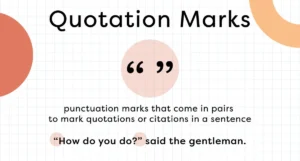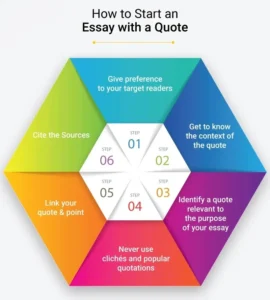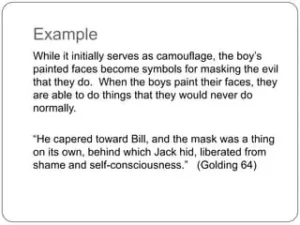When you sit down to write an essay, think of it as an invitation to a conversation. How you begin that conversation matters greatly, and starting with a well-chosen quote is like offering a warm greeting at the door. It’s a way to get your reader interested, to say, “Hey, let’s explore this together.”
Starting an essay with a quote isn’t about fancy decoration—it’s about creating a connection. It can make your reader feel something, trust what you’re saying, and find your words more engaging. But it’s not just about picking any quote; it’s about knowing when and how to use it.
In this comprehensive guide, we will demystify the process of commencing an essay with a quote, all while highlighting the importance of this technique, especially in the context of online assignment help. Our approach will prioritize simplicity and practicality, offering valuable insights into the significance of utilizing quotes in an essay effectively in academic writing. We will complement our explanations with concrete examples and relevant facts to ensure you grasp the concept thoroughly. As you progress through this guide, you will gain the expertise needed to leverage quotes for crafting an impressive introduction to your assignments, ultimately elevating the quality of your work from good to exceptional.
Why To Employ Quotes In An Essay

1. Quote in an Essay evokes Emotion:
One of the primary purposes of starting an essay with a quote is to evoke emotion. A well-chosen quote can set the tone for your entire essay, making your readers feel a particular way right from the start. Consider the following example:
“In the middle of difficulty lies opportunity.” – Albert Einstein
Starting an essay about overcoming challenges with this quote immediately creates a sense of hope and resilience in the reader. This emotional connection can be a powerful tool in engaging your audience.
2. Helps to Establish Credibility:
Another significant advantage of using quotes in an essay is that they help establish credibility. When you reference a respected figure or source in your introduction, you signal to your readers that your essay is based on reliable information. This is especially important in academic writing. For instance:
“According to a recent study by the World Health Organization, 80% of global healthcare workers reported experiencing burnout.”
This introductory quote lends authority to an essay on healthcare worker burnout, as it cites a reputable source.
3. Quote in an essay provides a Fresh Perspective:
Quotes in an essay also offer a fresh perspective on your topic. They can introduce alternative viewpoints or highlight the significance of your subject matter in a unique way. Here’s an example:
“The only thing we have to fear is fear itself.” – Franklin D. Roosevelt
Starting an essay on overcoming anxiety with this quote emphasizes the idea that fear can often be our greatest adversary. It provides a thought-provoking perspective that can draw readers in.
Choosing the Right Quote in an Essay

Selecting the appropriate quote for your essay is a crucial step. It requires careful consideration of your topic, audience, and the tone you want to set. Here are some tips to help you choose the right quote:
1. Relevant to the Niche:
The relevance of your chosen quote is paramount. It should align closely with your essay’s topic and thesis statement. In essence, the quote should serve as a supporting pillar for the message you intend to convey. Ask yourself, “Does this quote directly contribute to the central theme of my essay?” Avoid using quotes in an essay solely for decorative purposes, as this can confuse readers and dilute the impact of your introduction.
For example, if you’re writing an essay on climate change’s impact on polar bear populations, a quote from a renowned climate scientist or an environmental activist would be highly relevant. On the other hand, a quote about urban architecture may not fit the context and could distract from your essay’s core message.
2. Source Credibility:
The credibility of the source behind the quote matters significantly. Depending on the nature of your essay, you should select quotes in an essay from sources or figures that are authoritative and reputable. In academic essays, it’s often essential to use quotations from scholars, researchers, or experts in the relevant field. Conversely, personal essays may benefit from insights provided by well-known individuals or renowned authors who can add depth to your narrative.
For instance, if you’re writing a history essay about the American Civil Rights Movement, using quotes from prominent civil rights leaders like Martin Luther King Jr. or Malcolm X lends credibility to your argument.
3. Length of the Quote you’re gonna use:
The length of the quote should be proportionate to the purpose it serves in your essay’s introduction. In most cases, it’s advisable to use shorter quotes in an essay that can be seamlessly integrated into your writing. Long and complex quotes may disrupt the flow of your essay and make it harder for readers to grasp the main point.
Consider this: In an essay discussing the power of perseverance, a concise quote like “Never give up” (Winston Churchill) is more effective than a lengthy paragraph from a motivational book. Shorter quotes are easier for readers to digest and remember.
4. Interpretability:
Ensure that the chosen quote is easily understandable to your target audience. A quote laden with jargon or complex language may require extensive explanation, diminishing its impact. The best quotes are those that resonate with your readers immediately, without the need for extensive unpacking.
For example, if you’re writing a business-oriented essay aimed at a general audience, using a quote in an essay with simple, universally understood language like “Time is money” (Benjamin Franklin) is more effective than a quote laden with technical terminology.
5. Tone and Style:
The tone and style of the quote should align with the overall tone of your essay. Consider what emotional or intellectual response you want to evoke in your readers. Whether your aim is to inspire, inform, or provoke thought, the quote in an essay should harmonize with your intentions.
Suppose you’re crafting a persuasive essay on the importance of empathy in society. In this case, a quote that evokes empathy, such as “The best way to know how another feels is to put ourselves in his place.” (Charles Caleb Colton), complements the tone and theme of your essay.
How to Integrate a Quote in an Essay

Once you’ve chosen the perfect quote in an essay, it’s essential to integrate it smoothly into your essay. The way you introduce and contextualize the quote can significantly impact its effectiveness. Here’s a step-by-step guide on how to do it:
1. Introduce the Quote:
Provide some context for the quote before presenting it. This can include a brief explanation of who the author is, the circumstances in which the quote was made, or its relevance to your topic.
Example:
“As the renowned physicist Albert Einstein once said, ‘In the middle of difficulty lies opportunity.'”
2. Present the Quote in an essay:
Insert the quote into your essay using quotation marks. Be sure to attribute it to the author or source.
Example:
“In the middle of difficulty lies opportunity.” – Albert Einstein
3. Explain the Quote:
After presenting the quote, briefly explain its significance and how it relates to your essay’s topic or thesis statement.
Example:
“This quote by Albert Einstein reminds us that even in the face of adversity, there is potential for growth and progress. In this essay, we will explore how this concept applies to various aspects of life.”
4. Connect to Your Thesis:
Finally, bridge the quote in an essay to your thesis statement or the main argument of your essay. Explain how the quote supports or reinforces your central idea.
Example:
“By understanding Einstein’s wisdom, we can better appreciate the resilience of the human spirit and its capacity to turn challenges into opportunities for personal and societal development.”
Examples of Effective Quote Usage in an Essay

Let’s explore some real-world examples of how quotes in an essay can be used effectively in various types of essays:
1. Academic Essay:
Topic: The Impact of Climate Change on Biodiversity
Quote: “The Earth does not belong to us: we belong to the Earth.” – Marlee Matlin
Usage:
“Marlee Matlin’s quote serves as a poignant reminder that our actions have consequences for the environment. In this essay, we will delve into the profound implications of climate change on global biodiversity, analyzing the various factors contributing to the crisis and proposing sustainable solutions.”
[DO READ: ROLE OF REFERENCING IN ACADEMIC WRITING]
2. Personal Essay:
Topic: Overcoming Adversity
Quote: “It always seems impossible until it’s done.” – Nelson Mandela
Usage:
“Nelson Mandela’s words resonate deeply with anyone who has faced seemingly insurmountable challenges. In the pages that follow, I will share my personal journey of overcoming adversity and how Mandela’s wisdom guided me through the darkest of times.”
3. Persuasive Essay:
Topic: The Importance of Voting
Quote: “The ballot is stronger than the bullet.” – Abraham Lincoln
Usage:
“Abraham Lincoln’s assertion reminds us of the immense power we hold as citizens when we exercise our right to vote. In this essay, we will explore the significance of political participation and why every voice matters in shaping the future of our nation.”
Common Pitfalls to Avoid

While starting an essay with a quote can be highly effective, there are some common pitfalls to watch out for:
1. Overuse of Quotes:
Using too many quotes in an essay can overwhelm your readers and dilute the impact of each one. Aim for a balance between quotes in an essay and your original content.
2. Lack of Explanation:
Simply dropping a quote into your essay without providing context or explanation can confuse readers. Always connect the quote to your essay’s theme and purpose.
3. Inaccurate Attribution:
Ensure that you correctly attribute quotes to their respective authors or sources. Failing to do so can undermine your credibility.
4. Irrelevant Quotes:
Avoid using quotes that are only tangentially related to your topic. Each quote should serve a clear purpose in advancing your essay’s argument or theme.
Conclusion
Starting an essay with a quote in an essay is a skill that can elevate your writing to new heights. When used thoughtfully and strategically, quotes in an essay can evoke emotion, establish credibility, and provide fresh perspectives. Remember to choose your quotes in an essay wisely, integrate them seamlessly into your essay, and explain their relevance. By doing so, you can create introductions that engage your readers from the very first sentence.
As the statistics show, the impact of a well-placed quote in an essay is not to be underestimated. So, the next time you sit down to write an essay, consider beginning with a quote that resonates with your message and watch as your words come to life with added depth and resonance.


